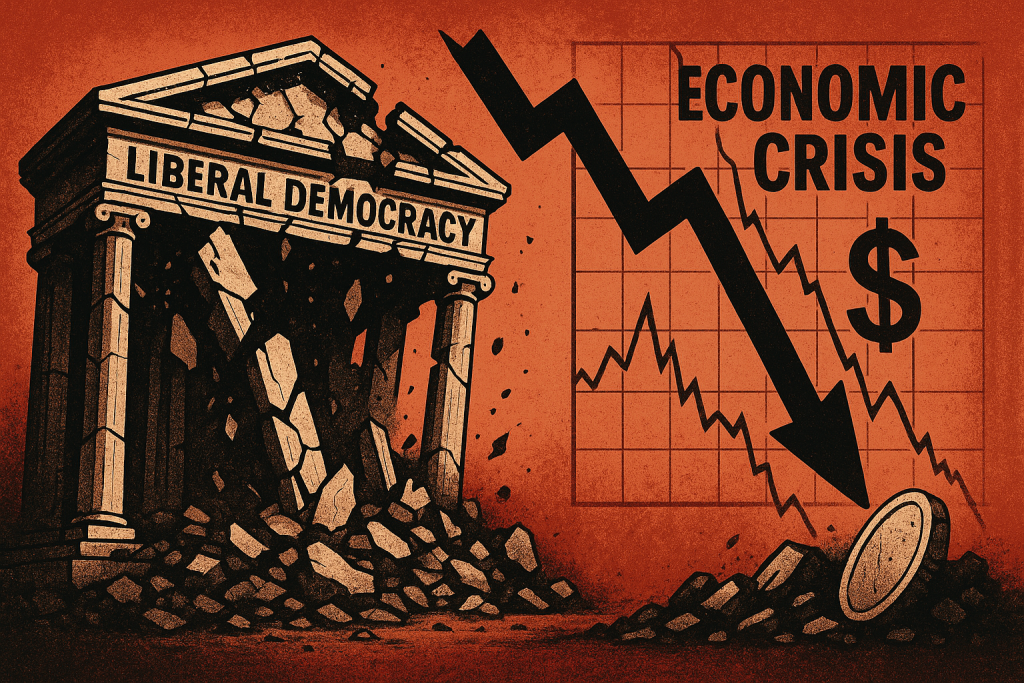🏛️ Introduction: Why Democracy Matters for Investors
When liberal democracy weakens—a process scholars call autocratization—it doesn’t just change politics. It reshapes markets. For investors, this means:
- Higher uncertainty about property rights and contracts.
- Less predictable policies, making long-term investment risky.
- Weaker central bank independence, fueling inflation and currency swings.
In short: institutional risk → monetary & credit risk → asset price collapse.
⚖️ Step 1: Institutional Risk – The First Warning Sign
Political scientists highlight four common “warning lights”:
- Rejecting democratic rules.
- Denying the legitimacy of opposition.
- Tolerating political violence.
- Restricting civil rights and freedoms.
Once these appear, economic signals usually follow.
📌 For investors, the erosion of independent courts and rule of law often comes first. This makes contract enforcement and property rights less secure.
💰 Step 2: How Political Risk Spreads into Markets
Here’s the typical transmission path from politics to the economy:
- Weaker judiciary → Contracts & property rights harder to enforce → Higher risk premium.
- Executive power concentration → Arbitrary regulation → Lower company valuations.
- Central bank interference → Distorted interest rates → Inflation and currency shocks.
- Suppressed media & civil society → Less transparency → Market confidence erodes.
👉 The key takeaway: Institutional breakdown soon shows up in exchange rates, inflation, and bond yields.
🌍 Case Studies: What Investors Can Learn
🇹🇷 Turkey – The “Index Up, Currency Down” Trap
- After political centralization, unorthodox monetary policies led to currency collapse and inflation surge.
- Stock indexes sometimes rose in local terms but lost value in USD terms because the lira fell even faster.
- Lesson: A rising index in local currency can be a mirage when the currency weakens.
🇻🇪 Venezuela – When Hyperinflation Destroys the Market
- Policy mismanagement and overreliance on state enterprises led to hyperinflation.
- The stock market had nominal gains but was worthless in USD terms.
- Lesson: In extreme cases, equity markets lose their role as a store of value.
🇵🇱 Poland – International Anchors Can Slow the Damage
- Judicial independence was challenged, but EU membership and currency stability softened the blow.
- Stocks faced a discount, but not collapse.
- Lesson: International institutions and stable exchange rates can buffer investors against full-scale crises.
📉 How Markets React – The Economic Mechanisms
When democracy declines, markets typically face:
- Rising discount rates: Investors demand higher returns → P/E ratios fall.
- Uncertain cash flows: Regulatory unpredictability raises earnings volatility.
- Currency risk: A weak local currency erodes real returns for foreign investors.
- Wider credit spreads: Borrowing costs rise → Higher default risk.
🚨 Investor Dashboard – Key Triggers to Watch
If two or more of these appear together, it’s time to move into defensive mode:
Institutional Triggers
- Judicial independence eroded.
- Election rules or term limits changed.
- Media or civic restrictions tighten.
Market Triggers
- Currency loses 8–10% rapidly.
- Government bond yields and CDS spreads spike.
- Foreign investors sell despite attractive dividends.

🛡️ Asset Protection Strategies
1️⃣ When Institutional Signals Appear
- Diversify currency holdings (USD, EUR, JPY).
- Hedge local equity exposure with ETFs or futures.
- Reduce positions in regulated or domestic-demand sectors.
- Favor export-driven companies with strong USD revenue.
- Set up overseas brokerage or custody accounts as a backup.
- Lower leverage and derivative exposure to avoid liquidity traps.
2️⃣ When Currency Crisis Escalates
- Move into safe-haven assets like T-Bills or money market funds.
- Treat local index rebounds cautiously—could be an illusion in USD terms.
- Hold practical foreign cash or deposits for real-life spending.
- Watch for capital controls, tax shifts, and price freezes.
- Small allocation to gold or commodities for long-term hedge.
- Use multiple information channels to avoid biased or censored data.
🔑 Conclusion: Two Critical Checkpoints
Investors should focus on two “gates”:
- Institutional decline → Starts valuation discounting.
- Currency collapse → Accelerates real losses.
- Turkey and Venezuela showed both gates opening, leading to severe losses.
- Poland showed that global anchors (like EU membership) can delay the worst outcomes.
📌 Final Thought: This article is not about politics—it’s about risk signals. Investors must react not to ideology but to evidence. Spot the signs early, and adjust exposure before the market does it for you.
📝 Disclaimer
This article is intended for educational purposes only. It does not constitute financial, investment, or legal advice. All investment decisions involve risks, and readers should conduct their own research or consult with a licensed financial advisor.
